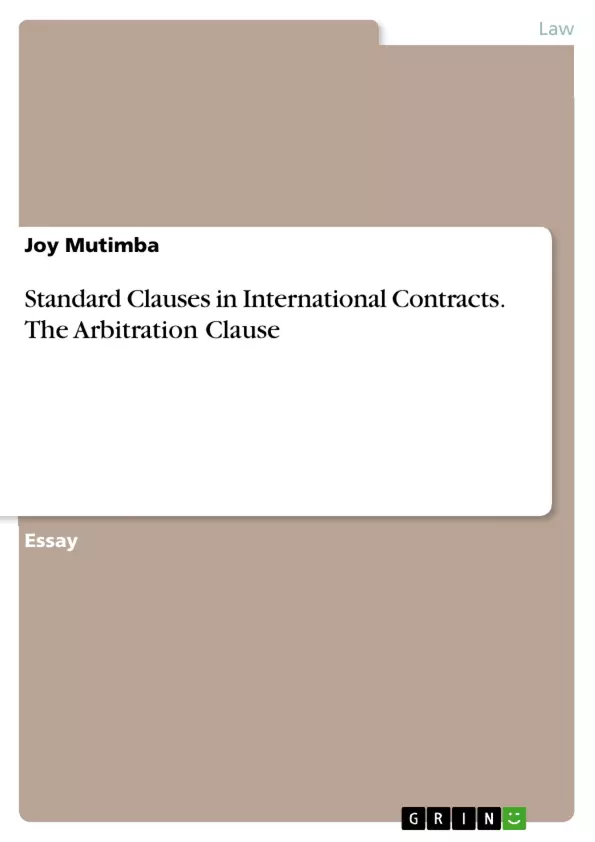The paper discusses the Definition and Purpose of the Arbitration Clause, Two Types of Contracts where the Arbitration Clause is typically found, Legal Basis & Regime, Differences in the use and interpretation of the Contract Clause between common law and civil law jurisdictions. You may use your home jurisdictions as illustrative, and Proper drafting of the Contract Clause and advice to avoid the pitfalls of relying on a “boilerplate” clause.
Inhaltsverzeichnis (Table of Contents)
- Introduction of the Arbitration Clause - Definition and Purpose of the Arbitration Clause
- The Arbitration Clause and Third Parties
- The Principle of the Autonomy of the Arbitration Clause
- Advantages and Disadvantages of Arbitration
- Two Types of Contracts where the Arbitration Clause is typically found
- What if the Arbitration Clause is Violated?
- Legal Basis & Regime - Are there any applicable international or national codes or conventions governing or limiting the use of the Contract Clause and are there any requirements for legal validity
Zielsetzung und Themenschwerpunkte (Objectives and Key Themes)
This document provides a comprehensive overview of arbitration clauses in international contracts, exploring their purpose, interpretation, and practical implications. It examines the legal framework governing arbitration agreements, including the principle of autonomy and the enforceability of awards.
- Definition and Purpose of Arbitration Clauses
- The Role of Third Parties in Arbitration Agreements
- The Autonomy of Arbitration Clauses from the Main Contract
- Advantages and Disadvantages of Arbitration
- Legal Framework and Requirements for Validity of Arbitration Clauses
Zusammenfassung der Kapitel (Chapter Summaries)
- Introduction of the Arbitration Clause - Definition and Purpose of the Arbitration Clause: This chapter introduces the concept of an arbitration clause, explaining its role in resolving contractual disputes. It highlights the advantages of arbitration over traditional court proceedings, emphasizing its flexibility and party autonomy.
- The Arbitration Clause and Third Parties: This chapter examines the issue of third-party involvement in arbitration agreements. It delves into the "group company theory" and explores how non-signatories can be bound by arbitration clauses.
- The Principle of the Autonomy of the Arbitration Clause: This chapter explores the principle of autonomy, which asserts the independence of the arbitration clause from the main contract. It analyzes the implications of this principle, particularly in regards to the law governing the arbitration agreement.
- Advantages and Disadvantages of Arbitration: This chapter provides a balanced perspective on the benefits and drawbacks of arbitration. It outlines the advantages, such as speed, confidentiality, and party autonomy, while also acknowledging the disadvantages, such as finality of awards and potential for high fees.
- Two Types of Contracts where the Arbitration Clause is typically found: This chapter explores the different types of contracts in which arbitration clauses are commonly found. It highlights the distinction between international and domestic contracts, as well as the prevalence of arbitration clauses in commercial and investment agreements.
- What if the Arbitration Clause is Violated?: This chapter addresses the consequences of violating an arbitration clause. It outlines the steps involved in enforcing an arbitration agreement and emphasizes the importance of adhering to its terms.
- Legal Basis & Regime - Are there any applicable international or national codes or conventions governing or limiting the use of the Contract Clause and are there any requirements for legal validity: This chapter explores the legal framework governing arbitration clauses. It discusses the relevant international and national codes, conventions, and requirements for legal validity.
Schlüsselwörter (Keywords)
The key terms and concepts covered in this text include arbitration clauses, international contracts, dispute resolution, party autonomy, legal framework, enforceability, and international conventions.
Frequently Asked Questions
What is an arbitration clause in an international contract?
An arbitration clause is a standard contract provision where parties agree to resolve any future disputes through arbitration rather than traditional court litigation. It is designed to provide a flexible, confidential, and efficient dispute resolution process.
What is the principle of autonomy of the arbitration clause?
The principle of autonomy, or separability, asserts that the arbitration clause is an independent agreement from the main contract. This means the clause remains valid and enforceable even if the main contract is found to be void or terminated.
Can third parties be bound by an arbitration clause?
Generally, only signatories are bound, but legal theories like the "group company theory" allow for non-signatories to be included in arbitration under specific circumstances, particularly in complex international corporate structures.
What are the main advantages of choosing arbitration over court proceedings?
Key advantages include party autonomy (choosing the arbitrators), speed of resolution, confidentiality of the proceedings, and the relative ease of enforcing awards internationally compared to court judgments.
What happens if a party violates an arbitration clause?
If a party attempts to sue in court despite an arbitration clause, the court will typically stay or dismiss the proceedings and compel the parties to resolve the matter through the agreed-upon arbitration process.
Why should one avoid using "boilerplate" arbitration clauses?
Relying on generic boilerplate clauses can lead to "pathological" clauses that are ambiguous or unenforceable. Proper drafting ensures the clause fits the specific jurisdiction, language, and nature of the contract.
- Citar trabajo
- Joy Mutimba (Autor), 2018, Standard Clauses in International Contracts. The Arbitration Clause, Múnich, GRIN Verlag, https://www.grin.com/document/423989



